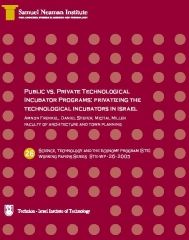The Public Technological Incubator Program (PTIP) was initiated in the early nineties by the Office of the Chief Scientist (OCS) in the Ministry of Industry and Trade in Israel in the wake of a large influx of immigrants from the former USSR, many of whom were scientists and engineers. Since the year 2000, private technological incubators began operating in Israel. This development owes its activity to the rapidly growing private (venture) capital (VC) that traditionally did not fund such projects. This study examines the differences and similarities between these two types of technological incubators public vs. private. It addresses the question whether there is still a need for the PTIP.
Based on our empirical analysis and findings, the main conclusion is that private incubators cannot fully substitute for public incubators; even after the entrance of the private sector into the area of technological incubator activity, there is still justification for the continuation of the PTIP. Private incubators tend to concentrate in selected fields while public incubators sponsor a large variety of fields. The PTIP is found to be the only answer to advance national objectives such as the promotion of peripheral regions and providing special incentives to some selected population groups (new immigrants) for whom such activities would otherwise be out of reach.












